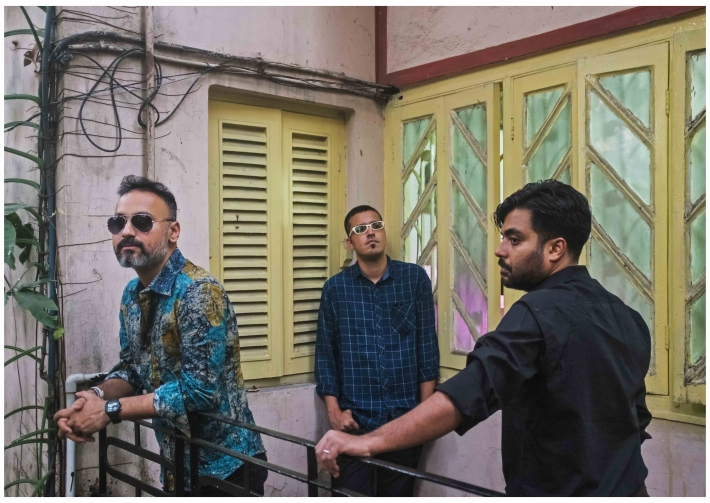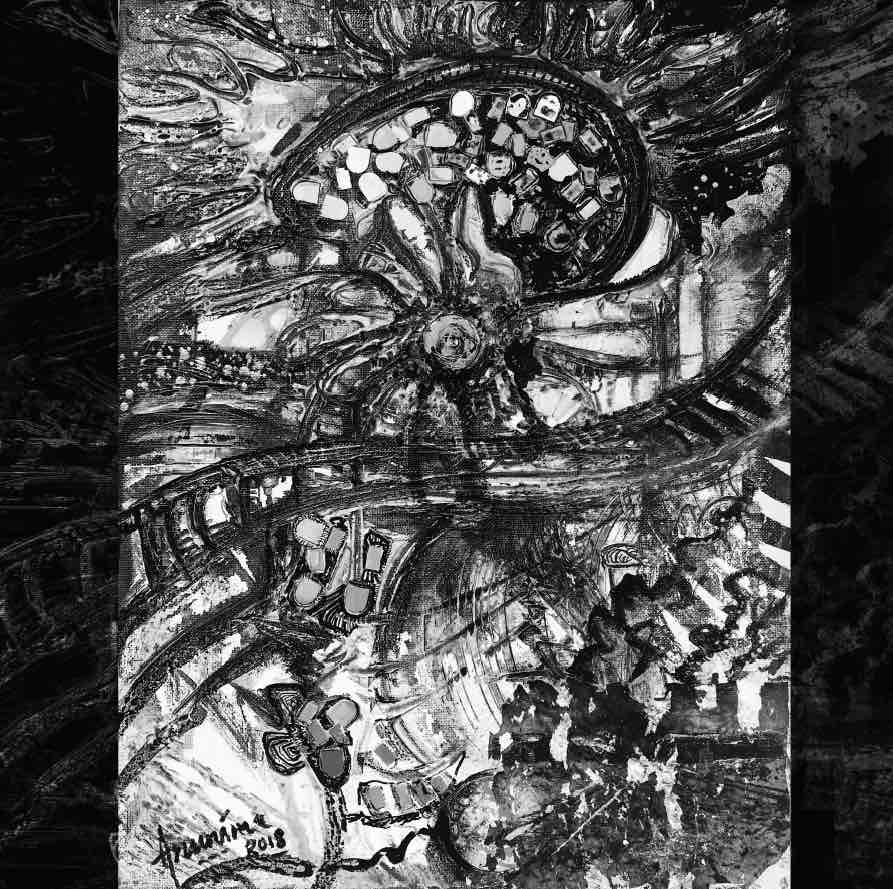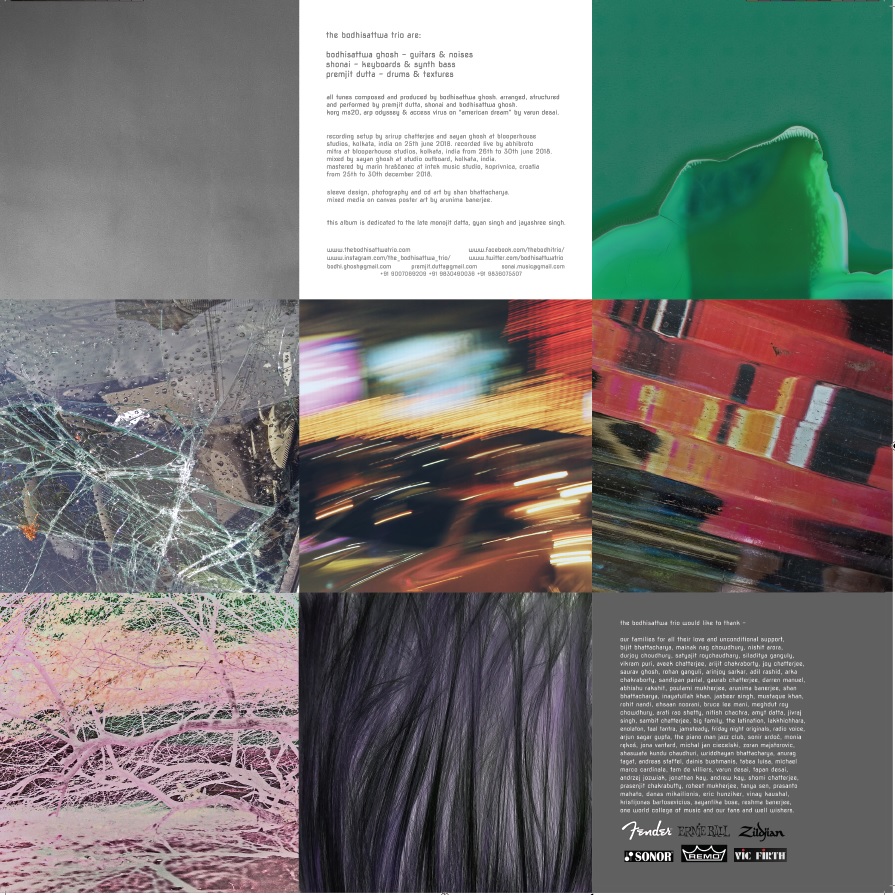
 Photo Courtesy: Shan Bhattacharya, Arunima Banerjee
Photo Courtesy: Shan Bhattacharya, Arunima Banerjee
'Would you like to be terrified?' Go no further than The Grey Album, the third offering by Kolkata based experimental dark jazz outfit The Bodhisattwa Trio. Helming a new line-up with Bodhisattwa Ghosh (guitars), Premjit Dutta (drums) and Shonai aka Arunava Chatterjee (keyboards, synth bass) filling in for bassist Bijit Bhattacharya, they released the album digitally worldwide on 25 January.
“None of us are black and white. We are all very complex characters. Humanity itself is not pure evil nor pure good. Also, the sound of the band cannot be pinned down,” said Bodhisattwa, explaining the reason behind the album name. It is a concept album divided into two parts, consisting of three songs each: Part 1 (Chaos to Creation) is an emulation of the artist’s thought process, while Part 2 (Creation to Chaos) is a reflection of humanity in today’s time.
Though out of context with the rest of the album, ‘Cronos (The Last Visit)’ was added as a bonus track. “After Shonai joined, we needed to have a chemistry with him. We rehearsed Cronos over and over again. That’s where the new line-up really bonded. So I wanted to capture that moment,” said Bodhisattwa. Incidentally, this song appears on all three of their albums.
Last year Bodhisattwa was in the hospital with an incurable infection. “Even the doctor was not sure whether I would make it out alive. All I could see was the void, the abyss – that’s the feeling of the song ‘The Void’,” said Bodhisattwa. It is also the flag bearer of the what Part 1 denotes - music created out of nothing. Starting with a brisk roll, the drum lends the song a forward slant, on which the guitar plays skin-crawling phrases.
.jpg)
The synth bass plays teasing short phrases, its tone that of a mechanical voice spewing garble, backed by mechanical drumming. A similar soundscape can be heard on ‘Degrees of Freedom’ - a two-part piece which takes off with an energetic rush and resolves into a long lull at the end, with a healthy dose of static thrown in. “Scientifically, the phrase denotes how the actions of each independent variable affects the system which they are a part of. In a way, we three are free musicians who are taking artistic and independent choices at every moment which is shaping the composition as a whole,” said Bodhisattwa.
‘Triple Standard’ talks about how social media avatars have added a layer to our double standard personalities. It has a repetitive three-part melody and broken guitar phrasing, which sounds like something unpleasant being stretched out of proportions. Two chaotic build ups don’t explode, keeping the cold undercurrent intact. Interestingly, the song is in a time cycle of five, and the three play different divisions of five.
While Bodhisattwa remains true to his dark intensity and Premjit provides a solid anchor and intelligent story-telling through rhythms, Shonai is the most interesting. Playing both synth and bass in Ray Manzarek style, he is Dr. Jekyll and Mr. Hyde! On one hand, smooth fillers and gentlemanly solos; on the other, ominous chords and haunting soundscapes with chaotic improvizations. And the shift between his two egos is untraceable.

Part 2 is where the band gets political! At a time when most music is self-indulgent or remunerative, it is refreshing to see an album reflecting reality – a purpose of art which is gradually eroding. The band’s maturity is demonstrated as their improvizations are more theme specific than the previous albums. Also, rock element has been completely shed.
‘American Dream’ is, in one word, disturbing. Varun Desai plays keys here and his parts were over-dubbed in his home studio. The rest of the tracks were single take recordings. The song creeps inside the skin and lays bare America’s greedy capitalism, exploitative imperialism and troubling decisions which can lead to the Third World War. The dream of allowing equal opportunity to achieve highest aspirations is actually a farce.
In the middle, a soft piano wistfully reminisces the good side of American culture and its massive influence, but current reality slips into the dream through the other instruments and distorts it. Chaos flexes its muscles and builds up to explode out the promise of napalm, war and blood to further the business of weapons – selling war to earn money to sell some more.
‘Shame (Death of a Nation)’ might make you clutch your head in despair. Ominous, hair-raising chords will leave the mind reeling to be carried on by mournful and circular guitar phrasing. An introspective look at our country, the song tears open its own guts to reveal modern India - onset of religious extremism, violence, rape, political corruption, and an overbearing cloud of capitalism. “When I’m travelling abroad, I’m ashamed to announce I’m Indian. Add to it (reasons mentioned above) bad taste in music and crass commercialization. This is the death of this beautiful country and its rich cultural heritage,” said Bodhisattwa.
The album was recorded live at BlooperHouse Studios by Abhibroto Mitra and mixed at Studio Outboard by Sayan Ghosh. For mastering, it was sent to Marin Hrascanec in Koprivnica, Croatia, to be produced under the label of Intek Music. Arunima Banerjee doodled out the artwork while Shan Bhattacharya looked after photography and sleeve design.
Clocking at roughly an hour, the shortest track is of six minutes. The length of the tracks can be agonizing for some listeners and requires immense concentration. It is quite heavy duty! The tone of the synth bass, which has been intentionally kept same throughout the album can also sound monotonous to the ear.
Now coming to the most haunting track, ‘The Last Train’ is Terror personified. “The song is about the Holocaust and Partition, the train of deportation and senseless killing in the time of war,” said Bodhisattwa, “I heard the melody in my head after watching the train scene in ‘Schindler’s List’ where prisoners are carried off to Auschwitz concentration camp.”
Buy and listen to the album here

The melody line is an ice cold hand clutching the heart and turning everything to the worst imaginable desolation. The fear, horror and despair emulated by a howling guitar doesn’t abate, only goes an octave higher to join crashing keys which is busy stirring up the smoke and flames! With a delay pedal hooked onto the snare, real-time tweaking and finely timed strokes by Premjit, a galloping train is re-created near the end. The guitar sounds the final horn and the train of sound rushes beyond human aural range to Station Hades.
Previous Article Gully Boy Soundtrack Review: Almost As Realistic As You Could Get Gully Boy Soundtrack Review: Almost As Realistic As You Could Get
|
Next Article The New Beard Of Harmony EP Is Simply Gorgeous The New Beard Of Harmony EP Is Simply Gorgeous
|


Leave a comment